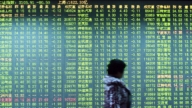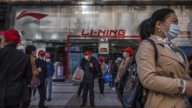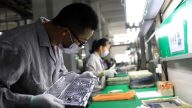【新唐人2011年6月27日讯】正当市场担忧中国通胀噩梦挥之不去、经济可能走向“硬着陆”的同时,中共国务院总理温家宝日前在英国《金融时报》撰文表态说,目前中国的物价水平 可控,压抑通胀政策已奏效。虽然股市对此随即作出反弹回应,但金融界分析师警告,不应将温家宝的言论视为政策转向的信号;也有专家认为,这只不过是温家宝 出访欧洲的外交公关。
6月24号正式开始欧洲之行前,温家宝在英国《金融时报》发表署名文章。他表示,已将“控制大陆物价上涨”,放在宏观调控的首要位置,并推出了一系列针对性的政策,而政策已经取得效果。
这番言论被部分市场分析师视为政策可能松动的积极信号,当天沪指上涨2.16%;上证指数成交额创两个月来新高。但有金融股市分析师警告,现在断言中国股市下跌行情已经结束,还为时过早。
美国南卡罗莱纳大学艾肯商学院教授谢田:“因为实际上现在国际上对中国的经济即将崩溃和硬着陆的猜想和猜测,金融上做空的举措层出不穷。中国(共)现在还是想继续用他的外汇储备来更多的购买欧洲国家,尤其是那些负债累累的一些欧洲国家的债券。在用打欧洲牌来对付美国的时候呢,他需要营造一种中国经济稳定繁荣的假象。”
而《路透社》引用一位不愿透露姓名的资深经济学家的分析指出,目前国际社会对中国的通胀高度关注,温家宝撰文更多是一种公关上的需要,与政策是否放松并没有必然的联系。
报导说,中国国际经济交流中心研究员王军也认为,中共领导人出访前配合外交方面的需要,发表一些文章没有什么特别。他说:“最多可能理解为货币政策可能不会再紧,至少加息上调存准的频率没那么多,但得不出政策可能放松的信号。”
《亚洲新闻》则认为,中国内部经济的稳定性仍然是一个谜。每年,中国都会上演数万起群体抗议事件。而造成动乱的原因,从通货膨胀到生活费用暴涨。温家宝在国际媒体上做出这类答复,似乎更多的是为了安抚日益担心中国经济局势的外籍投资者。
此外,美林美银经济学家陆挺注意到,温家宝最新的言论表述,与他在4月13号的措辞有明显差别。当时温家宝说,“国内物价上涨比较快、通胀预期增强,房地产市场成交量萎缩、多数城市房价还在上涨,宏观调控仍然面临较大压力。”
陆挺认为,尽管温家宝发表了一些正面讯息,但因此预期当局将很快转变政策立场,则可能是错误的,货币政策不会有太大改变。
自去年11月中国居民消费价格指数(CPI)创出5.1%的新高以后,今年CPI已经连续三个月位居5%以上,并在5月份创出5.5%的数字,是34个月以来的新高。
国家统计局日前公布:6月中旬大陆50个城市主要食品平均价格,结果猪肉价格依然大涨4%,民众担忧6月CPI恐将再度登顶,大陆发改委更是公开预测,6月CPI将比5月份还高。
目前分析师普遍预期6月份的通货膨胀将达6%以上。
新唐人记者梁欣、李明飞、葛雷采访报导。
Wen Jiabao: Inflation can be controlled
As China’s inflation remains a concern and
the economy heads towards a “hard landing",
Chinese Premier Wen Jiabao published an article
on Financial Times to claim that
China’s overall price level is manageable.
Although stock market rebounded after its publication,
financial analysts warned that his words didn’t signal
a monetary policy change and possibly are PR tactics.
Prior to Wen’s Europe visit on June 24, he said,
China had prioritized curbing inflation
as part of its macroeconomic policy and
China had introduced a series of effective policies.
Some analysts see his comments a positive signal to
loosen monetary policy; Shanghai Index rose 2.16%.
Its trading volume was at a 2-month high. However,
some analysts warned that it’s too early to conclude.
University of South Carolina professor Xie Tian:
Due to the speculation of China’s economy failure,
short selling (of Chinese stocks) is commonplace.
Chinese authorities continue to use foreign reserves
to buy indebted European countries’ bonds.
They need to create an image of economic prosperity.
Reuters quoted an anonymous senior economist
that as the world is concerned about China’s inflation,
Wen’s article is out of the foreign relations need;
it doesn’t signal a loosening of the monetary policy.
China Center for International Economic Exchanges’
Wang Jun believes the article is nothing special.
He said, “At most, monetary policy won’t be tightened.
But it is no signal that the policy will be loosened."
Asia News said economic stability is still a mystery
in China, as there are tens of thousands of riots
due to inflation and soaring living cost every year.
Wen’s comments are more likely made to calm down
the concerned foreign investors.
Merrill Lynch’s economist Ting Lu noticed that
Wen’s recent comments were different from
his speech on April 13. He said, “Inflation rate is rapid;
real estate trading volume dropped
while housing price in cities continue to rise.
The macroeconomic control is under great pressure."
Lu believes that despite Wen’s positive messages,
it could be wrong to expect the Chinese authorities
to change its policy stance soon.
China’s currency policy will not be changed much.
China’s CPI hit a record high of 5.1% in Nov. 2010.
In 2011, CPI remains above 5% for three months,
and it hit a 34-month high of 5.5% in May 2011.
National Bureau of Statistics released the average
food prices in 50 cities in June 2011.
The price of pork rose by 4%.
China Development and Reform Commission
forecasted CPI in June would be higher than in May.
Analysts expect inflation in June to be above 6%.
NTD reporters Liang Xin, Li Mingfei and Ge Lei.





























